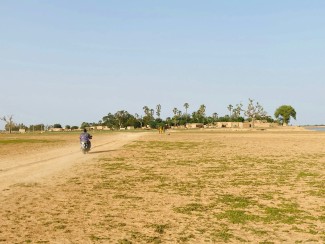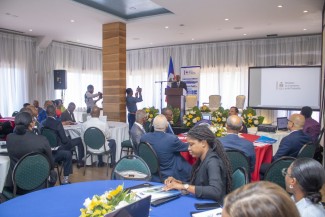In his opening remarks at the "Twenty years of supporting the integration of least developed countries into the multilateral trading system" event, WTO Director-General Roberto Azevêdo reminded WTO members of the importance that the EIF Pledging Conference for Phase Two of the EIF be a success.
"This December, the EIF will hold its Pledging Conference for Phase Two in Nairobi, in the margins of our 10th Ministerial Conference. This will be an important moment in ensuring the success of the EIF’s new phase. As I said at the General Council last week, a successful pledging conference would be a significant outcome of the ministerial conference. So I have strongly urged all existing and potential donors to be ready to lend their support," he said.
The event was aimed at discussing what has been achieved so far to help integrate least developed countries (LDCs) into the multilateral trading system and what members can aim to deliver in the future. Prior to the meeting, WTO Director-General Roberto Azevêdo and UNCTAD Secretary-General Mukhisa Kituyi signed a joint declaration on increased cooperation between the WTO and the United Nations Conference on Trade and Development (UNCTAD) in the area of trade and development and which mentions the EIF under the commitments in favour of LDCs.
Many panellists made reference to the EIF, as the only global Aid for Trade programme designed exclusively for the LDCs and at the heart of effective Aid for Trade delivery for LDCs.
Ambassador Shameem Ahsan of Bangladesh, in his capacity as Coordinator of the LDC Group , praised the EIF partnership for deciding the continuation of the EIF for a second phase and underlined the need for the Phase Two to receive adequate support for the EIF to effectively continue its work on productive capacity building in LDCs.
Ambassador Yvette Stevens of Sierra Leone, Chair of the EIF Board, emphasized the unique nature of the EIF. "The EIF approach is structured, systematic and holistic and this is what makes it different from all other technical assistance programmes. It provides LDCs with a framework to raise the profile of trade and identify and address all trade‑related needs. It is able to plug into the expertise of the international agencies to help get the necessary support required in a coordinated manner," she said. Ambassador Stevens also underlined important areas of EIF support for LDCs' integration into the global trading system, such as trade-related policy and capacity building, trade advocacy, policy coordination and dialogue with all stakeholders such as the private sector, civil society and donors, and the evidence-based analytical work which allows LDCs to engage with donors on priority actions, reforms and specific projects to address key constraints.
"The funding of EIF Phase Two is one of the outcomes of Nairobi Ministerial Conference will care the most," she added.
The importance of the EIF analytical work in helping LDCs identify and pursue their trade priorities was also highlighted by Professor Alan Winters from the University of Sussex.
Panellists from donor countries also voiced an important support for EIF Phase Two. EU's Ambassador Marc Vanheukelen emphasized the high relevance of the EIF task in support of LDCs integration in the global trading system and reiterated his institution support to Phase Two of the programme. Ambassador Neple of Norway, while underling the importance of a successful Pledging Conference in Nairobi, called for a wider use of the platform provided by the EIF to ensure better leveraging of additional funds at national level.
The Pledging Conference for Phase Two of the EIF will take place on 14 December 2015 in Nairobi, at the outset of the WTO Tenth Ministerial Conference. The Indicative Budget estimate for Phase Two is between US$274 and 320 million.
Note to the Editor:
The Enhanced Integrated Framework (EIF) is the only Aid-for-Trade Programme exclusively dedicated to support Least-Developed Countries (LDCs) integration in the global trading system. Unique partnership among LDCs donors and international agencies, the programme works in the 51 world's poorest countries, with the mission of supporting them to use trade as a vehicle of economic growth and poverty reduction.
The EIF support is provided through: evidence-based analysis which helps countries to identify, prioritize and address potential growth areas and major constraints to trade; advocacy and stakeholder mobilization to ensure that trade contributes to the national development agenda; setting up institutional and coordination mechanisms for trade policy dialogue (including with private sector an civil society) and donor coordination; support to the formulation and implementation of projects based on the identified priorities.
In January 2016, the EIF will start its Phase Two (2016-2022) decided by the partnership after an independent positive evaluation of the results of Phase One (2009-2015).
The Pledging Conference for Phase Two of the EIF will take place on 14 December 2015 in Nairobi, at the outset of the WTO Tenth Ministerial Conference. The Indicative Budget estimate for Phase Two is between US$274 and 320 million.
For more information:
Website: www.enhancedif.org
Twitter: @eif4LDCs
Email: eif.secretariat@wto.org
If you would like to reuse any material published here, please let us know by sending an email to EIF Communications: eifcommunications@wto.org.



